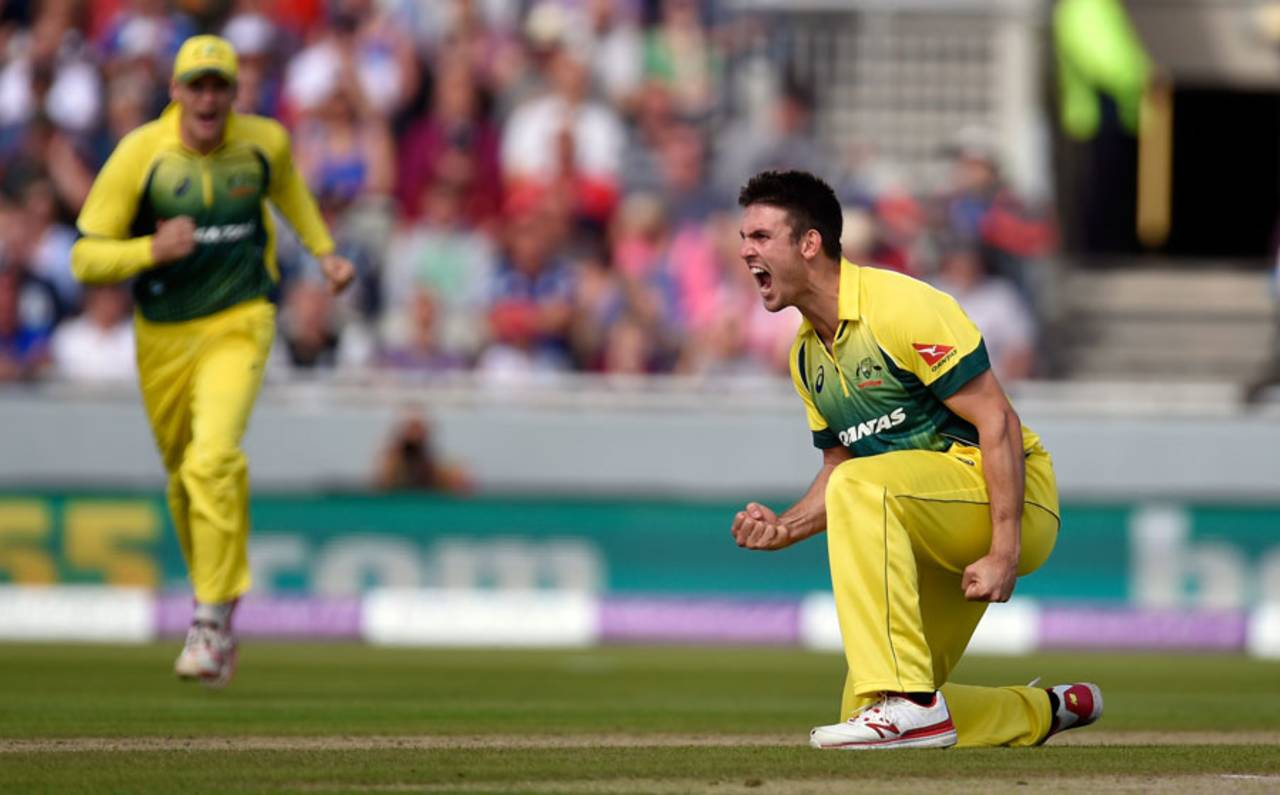England's rapid demise, Marsh fills his boots
Stats highlights from the fifth ODI at Old Trafford, where Australia knocked England over in short order
S Rajesh
Sep 13, 2015, 4:55 PM

Mitchell Marsh finished the series with eight wickets at 24.12 • Getty Images
8 The number of bilateral ODI series Australia have won in England, out of 15. They won the previous series, in 2013, by a 2-1 margin. In fact, in the last five Ashes series in England which have also included a bilateral ODI series - in 1997, 2005, 2009, 2013, and 2013 - the same team hasn't managed to win both the Tests and the ODIs. In 1997, England won the ODIs but Australia took the Test series, while in 2005, 2009, 2013 and 2015, Australia won the ODIs but lost the Tests. (In 2001, there was a triangular series, also involving Pakistan, which Australia won.)
154 Balls remaining when Australia won the game - it's their third-largest win against England, in terms of balls remaining. Only seven times have England lost an ODI with more balls to spare.
0 Number of times England have been bowled out for fewer than 138 after winning the toss and batting first in a home ODI. Their previous lowest total in such a game was 176, also against Australia, at The Oval in 2001. Overall, England's total is their sixth-lowest in ODIs when they've won the toss and chosen to bat. Their lowest in such matches is 88, against Sri Lanka in Dambulla.
33 Overs that England's innings lasted, which is their fourth-lowest in any ODI when they've batted first. One of those instances also includes a shortened, 24-over game, against New Zealand in 2008, when they were bowled out in the last ball of their 24th. This is England's poorest such effort against Australia (when batting first) - their previous lowest was 34.3 overs in Adelaide in 2007.
2003 The last time England were seven down for 85 or fewer runs in an ODI against Australia. The last time it happened was in the first final of the VB Series in January 2003, when England were 79 for 7, and were eventually bowled out for 117. They lost by ten wickets. Overall, there have been only four instances when England have been seven down for fewer than 85 in an ODI against Australia.
1 Number of times England's top four batsmen have contributed fewer than 21 runs - which was their aggregate here - in an ODI against Australia: they made a combined total of 14 runs at Lord's in 2005. Overall, England's top four have scored fewer than 21 in an ODI (when they have all batted) only five times in their ODI history.
6 Instances of an Australian bowler taking three or more wickets against England at an economy rate better than 2.1 runs per over, which was John Hastings' economy in this match. This was only the third such instance since 2000, after Andy Bichel's 7 for 20 off ten overs in the 2003 World Cup, and Doug Bollinger's 3 for 20 at Old Trafford in 2010.
13 Wickets for Mitchell Marsh in eight ODIs against England, at an average of 19.76; his two best ODI bowling performances have both come against England - in the 2015 World Cup opener, he took 5 for 33 against them, while he took 4 for 27 here. Against other teams, he has six wickets in 15 ODIs, at an average of 53.50.
7.18 The run rate during the 109-run stand between Aaron Finch and George Bailey, the sixth-best for a third-wicket century stand for Australia.
1909 The last time two left-arm fast bowlers opened the bowling for England in any international game. This has only happened four times in England's cricket history.
S Rajesh is stats editor of ESPNcricinfo. @rajeshstats